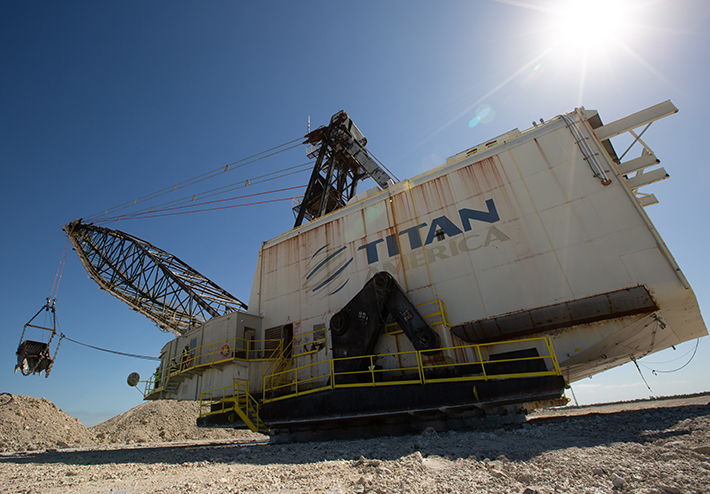
Transitioning to a Decarbonized Future
Concrete is an ubiquitous part of daily life worldwide. Society relies on concrete to perform in a safe, resilient, reliable, and sustainable manner. Virtually all of Titan America’s finished products must meet an ASTM International standard, most notably:
- Specification for concrete aggregates (C33/C33M);
- Specification for ready-mixed concrete (C94/C94M);
- Specification for loadbearing concrete masonry units (C90);
- Specifications for Portland cement (C150/C150M) and blended hydraulic cements (C595/C595M), respectively; and
- Specification for coal fly ash and raw or calcined natural pozzolan for use in concrete (C618).
These are required by regulation, such as state and local building codes but also in contracts and construction project specifications. Many of the raw materials used in the manufacture of cement and concrete are also subject to ASTM standard specifications.
These standard specifications reference dozens of ASTM tests that Titan labs and field technicians perform each day. All standards are easily accessible to staff through the ASTM Compass platform. Titan America participates in and benefits from the ASTM Cement and Concrete Reference Laboratory inspection and interlaboratory testing programs, which support industry-wide acceptance of certificates of quality and other performance reporting of Titan America offerings.
ASTM standards facilitate commerce by setting clear expectations between manufacturer and purchaser, defined by robust, reliable, and widely available test methods. ASTM standards mean that customers and specifiers can use cement and concrete with confidence and without the need to be experts in Titan America’s materials or processes. In addition, Titan can introduce new products and enter new markets faster because the expectations for product acceptance are clear and test methods are readily available. Compliance with an ASTM standard specification brings immediate credibility due to ASTM’s respected, consensus-based standardization process.
Looking forward, Titan America has committed to achieving net-zero CO2 (carbon dioxide) across the concrete value chain by 2050, as validated by the Science Based Targets initiative. The changes required to fully decarbonize will reshape the cement and concrete industry and require manufacturing methods and products to change. Therefore, Titan is actively involved in the standardization process to develop test methods and specifications that will help define the next generation of low-carbon cement and concrete, delivering on customer and market performance requirements as well.
For example, Titan introduced Type IL cement shortly after the specification for blended hydraulic cements (C595/C595M) was revised to include this new type of cement. IL is associated with approximately 15% lower CO2 emissions compared to conventional Portland cement, while still meeting rigorous performance criteria. Today, IL represents over 50% of Titan America’s bulk cement production and is enabling the company to continue its emissions reductions, which are currently in excess of 120,000 tons of CO2 emissions annually, over a half a million tons in the last several years. These efforts have eliminated the emissions caused by more than 110,000 passenger vehicles driven in one year.
In addition, fly ash derived as waste from coal power plants is an important raw material in the manufacture of both cement and concrete, enhancing performance and reducing environmental impact. As the power industry decarbonizes and coal-powered plants are retired, Titan America’s affiliate, Separation Technologies, has expanded its focus from the beneficiation of freshly generated fly ash to include fly ash previously discarded and stored in landfills and ponds, in accordance with the guide for harvesting coal combustion products stored in active and inactive storage areas for beneficial use (E3183).
Titan is also evaluating and incorporating other novel and alternative supplementary cementitious materials, in accordance with the guide for evaluation of alternative supplementary cementitious materials (ASCM) for use in concrete (C1709). Separation Technologies has demonstrated that its proprietary fly ash beneficiation system is suitable for fly ash harvested from landfills and ponds and produces a product that meets existing ASTM standards, resulting in faster market access and greater progress towards fully decarbonized concrete.
To validate progress and meet the increasing expectations of customers and other stakeholders for decarbonization, Titan America offers Environmental Product Declarations (EPDs) that quantify the global-warming potential and other environmental impacts of individual concrete mixes. Given that concrete is highly customizable, often for each building project, Titan America has implemented a software platform that generates EPDs instantly. Crucially, this software tool is third-party verified through the ASTM EPD Program.
The committees on sustainability (E60) and performance of buildings (E06) publish several guides, standards, and practices that connect Titan America with customers. These allow each entity to more efficiently leverage regionally available technologies and material supplies to enhance the built environment while improving the sustainable attributes of concrete construction.
ASTM International standards are an essential part of Titan America’s business and will play a critical role in the transformative future trends of decarbonization. ■
Company Snapshot
- Titan America LLC
- Company Headquarters: Norfolk, Virginia
- Description: Titan America LLC and its subsidiaries are leading heavy building materials producers in the Eastern United States. Titan America’s subsidiary companies produce cement, construction aggregates, ready mixed concrete, concrete block, and beneficiated fly ash. Its parent company, Titan Cement International S.A., is headquartered in Brussels, Belgium, and is a participant in the United Nations Global Compact, the world’s largest corporate sustainability initiative, based on companies’ commitments to implement universal sustainability principles and to support United Nations Sustainable Development Goals.
- Number of staff: 2,300
- Trading Area: Global
 SN Home
SN Home Archive
Archive Advertisers
Advertisers Masthead
Masthead RateCard
RateCard Subscribe
Subscribe Email Editor
Email Editor